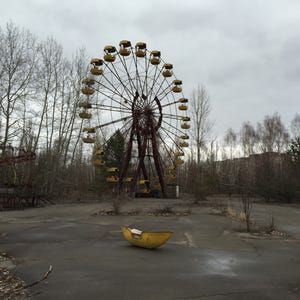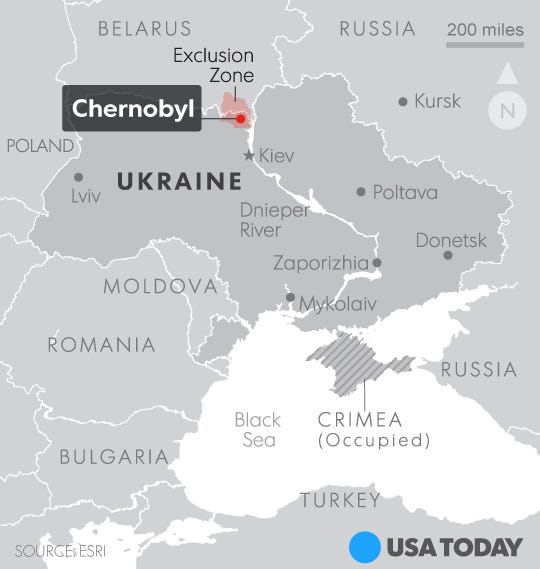Exiled scientist亡命科学者バンダジェフスキー博士:
'Chernobyl is not finished, it has only just begun'「チェルノブイリは終わっていない。始まったばかりである。」
*訳者注Translator's note:もちろん福島も。バンダジェフスキー博士も福島のことを心配し、何度も来日されています。
Of course this applies to Fukushima. Dr. Bandazhevsky visited Japan several times being very concerned with the situation in Fukushima.
そして福島は、いまだ不十分なチェルノブイリの健康被害の報道よりも、さらに報道されていません。
Moreover, health hazards in Fukushima has been covered much less compared to Chernobyl, which has also been undercovered.
Yury Bandazhevsky detailed Chernobyl’s devastating impact on people's health, particularly that of children, in Belarus. Now he lives in exile while the government insists "Everything's OK."
バンダジェフスキー博士が、ベラルーシの特に子供における健康への影響について詳しく語りました。博士は現在、「すべて大丈夫である」と喧伝する政府により、亡命しています。
ユーリ・バンダジェフスキー博士(59)は、ベラルーシに置いて、チェルノブイリの人々への健康影響を研究する機関を設立した初めての科学者であった。特に、ウクライナの国境から120マイル離れたゴメリ市近郊において、子供への健康影響を調査したのである。1999年、博士はベラルーシで逮捕され、8年間投獄された。容疑は、(博士が学長を務めていた)ゴメリ州立医科大学において、子供を入院させたいと希望した保護者らから賄賂を受け取ったと言う事であるが、博士は起訴内容を否定している。
The National Academy of Sciences and Amnesty International say he was detained for his outspoken criticism of Belarus’ public health policies following the nuclear disaster. He was released in 2005 and given French citizenship, after rights groups took up his case along with the European Union, Britain, France and Germany. He now runs a medical and rehabilitation center outside Kiev dedicated to studying and caring for Chernobyl’s victims.
全米科学アカデミーとアムネスティー・インターナショナルは、博士が原発災害の後、ベラルーシの保健政策を明白に批判したことから投獄されたと言明している。博士は2005年に釈放され、人権組織がEU,英国、フランス、ドイツのと共にこの問題を公けにしたことにより、フランスの市民権を獲得した。博士は現在、ウクライナのキエフに置いて、チェルノブイリの犠牲者への医療措置やリハビリを行うセンターを運営している。
Bandazhevsky has not returned to Belarus for fear that his family there could be persecuted or arrested by authorities.
Here are his words, edited and condensed for clarity:
KIEV, Ukraine — If you were told that a lot is already known in Ukraine and Belarus about what Chernobyl has done to these countries, than I can tell you that you are wrong. How can I put it? It is only after 30 years that we are starting to see the real impact. We can say for sure that Belarus was affected more. There was more radioactive fallout there. The doses the general population received were huge. My students and colleagues and I observed it when I arrived in Gomel in 1990 to organize the medical institute (now a university).
At the first, we were observing the effects of the large doses because Gomel was located in the epicenter of this high level of contamination. Then we started to look at the accumulation of radioactive elements in internal organs at lower doses, children’s in particular. We were already seeing a complex pathology affecting the endocrine system (which produces hormones), the cardiovascular system and almost all the internal organs. This was work that had never been done in Belarus and has not been done since.

See Chernobyl through the eyes of an artist as Mariya Kobylynska interprets the disaster through her beautiful paintings. Kim Hjelmgaard, USA TODAY
Several million people in Ukraine live on land contaminated by radiation, so we need to evaluate a very large number of people. But there are no such projects. You have to live among the people here to truly understand what is happening, because the problem is very complicated. I have even tried to send interested people to the cemetery in Ivankiv so they can see for themselves how many graves are there — many who died at a very young age. None of this is in the official statistics.
I don’t have any objective information about what is happening now with the health of children in Belarus. Everything is closed. The government says, ‘Everything’s OK, everything’s OK.’ But I get telephone calls from people in Gomel and they tell me that many of the children we were observing before I left have died. They were of different ages: 6, 12, 14. I will never forget appearing on television in Belarus with the president (Alexander Lukashenko). I was saying we were seeing very serious problems in children because of radiation, while he was saying ‘Everything’s OK.’ But I can’t touch this, because I can’t go there, or work there.
For me, the problem of Chernobyl is not finished, it has only just begun.
I am very much afraid that in one or two generations from now, the (descendants) of the population of Belarus and Ukraine that were affected by Chernobyl will vanish. I am afraid of that very much. I don’t want my countrymen to perish. It’s possible that help from the international community to understand what is going on is needed now, just as much as it was immediately after the accident.












































